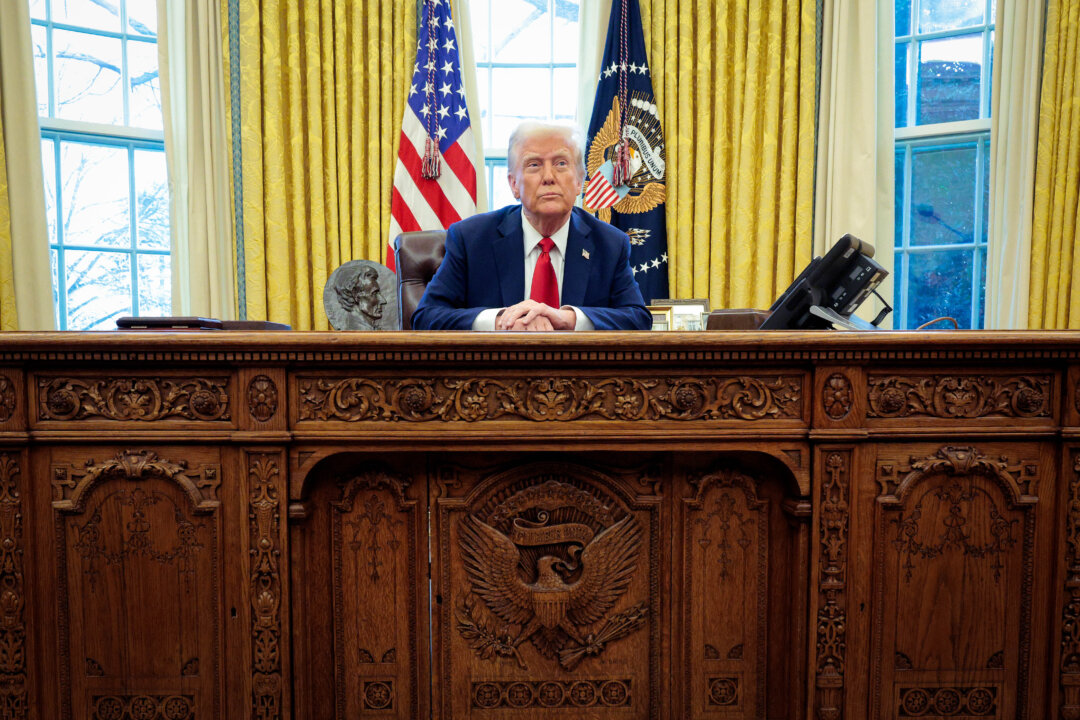The US will impose 25 percent tariffs on Mexico and Canada, and 10 percent on China, the White House said.
WASHINGTON—The Trump administration will impose tariffs on Mexico, Canada, and China starting on Feb. 1 over the countries’ roles in facilitating the flow of illicit fentanyl into the United States, the White House announced on Jan. 31.
The tariffs on Mexico and Canada will be 25 percent, and 10 percent tariffs will be imposed on China. The move marks a follow-through of a pledge made by Trump in November 2024 to place tariffs on goods from those countries.
President Donald Trump said that these tariffs will be additional to existing levies. He noted, however, that tariffs on Canadian oil imports will “probably” be set at 10 percent, rather than 25 percent.
The president added that there’s nothing China, Canada, or Mexico can do to prevent the tariffs from going into effect on Saturday.
“No, not right now,” he told reporters in the Oval Office, noting that the tariffs are not a negotiating tactic.
Trump noted that the United States has significant trade deficits with all three countries. They’re sending huge quantities of fentanyl, he said, which is responsible for killing many Americans every year.
“We’re not looking for a concession. We’ll just see what happens,” he said.
Trump said that China makes fentanyl and sends it to the United States through various places, primarily Mexico, but also a significant amount through Canada.
The president also previewed sweeping tariffs in the coming weeks on chips, pharmaceuticals, medicine, steel, aluminum, and copper, as well as against the European Union.
Canada, Mexico Respond
Canada and Mexico have vowed to retaliate should Trump go through with the tariffs.
Mexican President Claudia Sheinbaum said on Friday that Mexico has maintained a dialogue with Trump’s team since before he returned to the White House, but she emphasized that Mexico has a “Plan A, Plan B, Plan C for what the United States government decides.”
Canadian Prime Minister Justin Trudeau earlier stated that his country is prepared to retaliate if Trump moves forward with imposing tariffs.
“We’re ready with a response, a purposeful, forceful but reasonable, immediate response,” Trudeau said in Toronto before a Jan. 31 meeting of the Council on Canada–U.S. Relations.
In response, White House press secretary Karlone Leavitt said, “I think Justin Trudeau would be wise to talk to President Trump directly before pushing outlandish comments like that to the media.”
Following the U.S. announcement, Trudeau emphasized that Canada would take “forceful and immediate” action if necessary.
“No one—on either side of the border—wants to see American tariffs on Canadian goods,” Trudeau wrote on social media platform X. “I met with our Canada-U.S. Council today. We’re working hard to prevent these tariffs, but if the United States moves ahead, Canada’s ready with a forceful and immediate response.”
Democrats have also reacted to the tariff news.
“Donald Trump’s White House just confirmed that he’s ready to set off his ‘inflation bomb’ and skyrocket prices with a new $100 billion national tax,” Alex Floyd, DNC rapid response director, said in a statement.
“Trump’s wildly unpopular and unaffordable economic agenda will hurt consumers and tank businesses.”
Fentanyl Crisis
However, some Trump allies have welcomed the news.
According to Robert Marbut, former homelessness czar for the first Trump administration, fentanyl has killed more Americans in the past five years than all wars combined in the past 100 years.
In the new documentary “Fentanyl: Death Incorporated,” Marbut provides a detailed look at the crisis.
“Fentanyl is an existential threat to the United States, unlike anything we’ve ever seen,” he told The Epoch Times.
“This is different from cocaine or crack, and if it takes a tariff to get the attention of Canada and Mexico to do the right thing, then that’s what we have to do.”
Marbut criticized Canada’s liberal drug policies and Mexico’s unstable regions, where cartels control the drug trade.
He said that if the U.S. government is going to tackle fentanyl, it needs to recriminalize drugs domestically, stop China from sending precursors, get the biker gangs in Canada under control, and force Mexico to rein in the cartels.
“Fentanyl is a hundred times more powerful than morphine,” he said. “Fentanyl dusts will kill children, fentanyl dusts will kill adults. So just three grains of salt equivalent will kill anybody.”
According to the Drug Enforcement Administration, fentanyl overdose is the leading cause of death for Americans aged 18-45.
White House deputy chief of staff Stephen Miller said that fentanyl has become “a weapon of mass destruction,” causing more American deaths than all wars combined. He told reporters that “a sophisticated network of criminal cartels” is trafficking fentanyl into the United States, with precursors coming from overseas. These cartels exert government-like control over large swaths of Mexican territory, posing a serious threat to U.S. national security, he said.
About 80 percent of Canada’s and Mexico’s exports go to the United States.
The first Trump administration imposed tariffs on more than $300 billion worth of Chinese goods to respond to an array of unfair trade practices, including intellectual property theft.
The Biden administration has kept all of them in place and increased rates on $18 billion in goods, including electric vehicles, solar panels, medical equipment, lithium-ion batteries, steel, and aluminum.
Both administrations have used tariffs to level the playing field for domestic manufacturers as China unloads its excess production in the U.S. market at cheap prices.
The markets reacted to the tariff news, with the Dow Jones Industrial Average falling more than 300 points on Friday.
Noe Chartier, Terri Wu, and Andrew Moran contributed to this report.

